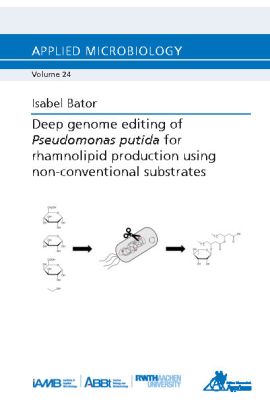Surfactants are valuable products with many potential applications due to their amphiphilic structure. The majority of surfactants are produced partially or completely from fossil feedstocks, having negative environmental impacts as a consequence. Biosurfactants can be produced as an alternative and have the potential to replace fossil-based surfactants. Moreover, the production of biosurfactants, such as rhamnolipids, with microbes using renewable substrates contributes to the establishment of a sustainable bioeconomy. However, the production with wild-type strains is challenging in many ways and alternative hosts are investigated, such as Pseudomonas strains. Pseudomonads are promising candidates for bioprocesses as they can be applied for redox-intensive reactions and due to their intrinsic endurance toward stressors.
In this thesis, the non-pathogenic Pseudomonas putida KT2440 was engineered for the synthesis of rhamnolipids from renewable feedstocks. Lignocellulose-derived sugars and organic acids, such as glucose, xylose, and galacturonic acid, were used. Furthermore, ethanol was used, which can be produced from lignocellulosic biomass by microbes. Synthetic biology tools were used to enable efficient substrate utilization. The resulting strains were characterized regarding their growth and rhamnolipid production. Different biomass yields, growth rates, product titers, and product yields were observed for all substrates, which allowed new insights into the respective metabolic pathways. In addition, a unique biosurfactant production process was developed by using ethanol as carbon source and defoamer simultaneously, tackling the challenge of excessive foam formation.
Moreover, metabolic engineering was performed to enhance rhamnolipid production. P. putida KT2440 was modified by targeted deletion of dispensable genomic regions coding for energy-intensive processes or the synthesis of competitive metabolites. With this, rhamnolipid titers could be increased by about 70%. In addition, the overexpression of heterologous genes was performed to overcome a bottleneck in precursor supply. The combination of these strategies further increased the rhamnolipid production up to 94%.
Altogether, this thesis demonstrates that P. putida KT2440 is a suitable host for sustainable biosurfactant production with improved yields enabled by metabolic engineering using renewable substrates, thereby contributing to the realization of efficient and industrial bioprocesses.
| Autor | Bator, Isabel |
|---|---|
| Lieferzeit | 3-4 Tage |
| Gewicht | 0.313 kg |
| Erscheinungsdatum | 28.01.2021 |
Institut für Angewandte Mikrobiologie (iAMB)
Deep genome editing of Pseudomonas putida for rhamnolipid production using non-conventional substrates
Kurzbeschreibung
A transition from a fossil-based to a sustainable bio-based industry is crucial due to environmental pollution. This can be achieved by the production of chemicals with microbes using renewable substrates. In this context, the promising host P. putida KT2440 was engineered for efficient utilization of lignocellulose-derived substrates and heterologous production of biosurfactants, namely rhamnolipids. Thereby, the thesis contributes to establishing eco-friendly processes.

